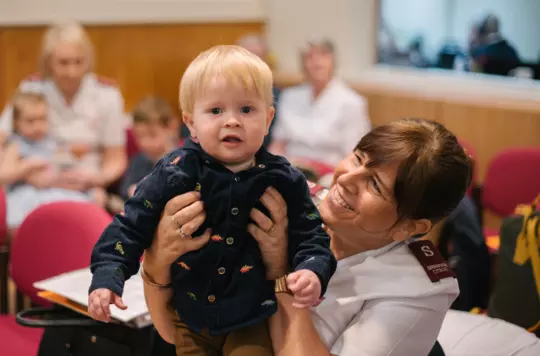Day 93: Praying for all those affected by the Aberfan disaster (1966)
18 September 2024

Join with Salvationists of the Wales Division for day 93 of 150 days of prayer.
- 'Lord, your rules remain strong and true. Your house will always be holy, because you are holy’ (Psalm 93:5, EasyEnglish Bible).
1966
On 21 October 1966, 116 children and 28 adults died in the Aberfan disaster.
Under the headline, ‘The Aberfan Tragedy’, the 29 October War Cry reported on the ‘round-the-clock ministry by Salvationists’:
‘From about noon on Friday, a few hours after news of the tragedy had broken, Salvationists have been maintaining a continuous night-and-day service of compassion. As we go to press Major Arthur Petit (Merthyr Tydfil) and Captain Clifford Howes (Treharris), commanding officers of the two corps nearest to Aberfan, will, with other Salvationists, join local ministers in visiting the homes of the bereaved.’
Mentioning that ‘the shifting tip had buried the Pant Glas Junior School’, the report went on to say:
‘Headquarters was first established in one of the extensively damaged homes, but later police put an empty house at the Army’s disposal … it was possible to take much-needed food, and other comforts to the “front-line” diggers high up on the mountain of debris. Help was also given in the evacuation of doomed property.
‘Probably the most valued contribution to the alleviation of distress was that performed in and around the Bethany Chapel, which served as a mortuary. With but very few exceptions, every parent who was called to identify a child was accompanied by a Salvation Army officer, who then returned with the bereaved to the home of sorrow … for a time, Major Derek Tribble supervised the preparation of the children’s bodies for their parents’ ordeal.’
The 5 November War Cry quoted a local minister reflecting on the spiritual impact of the tragedy:
‘“Any cheap faith we had has been shattered by this terrible weekend. That God who is merely a projection of our prevailing moods of well-being has surely died this day. God knows there are no cheap comforts; and if there were, they would not be worth anything. There are no easy answers – and how unconvincing and false such answers would be!”
‘In these words, the Rev Derwyn Morris-Jones tried to strengthen the faith of those who had suffered in the Aberfan disaster. His text in the memorial service held at Merthyr Tydfil: “It is not the will of your Father who is in heaven that one of these little ones should perish.”’
The following issue had a report titled: ‘The Woman Who Loves Wales’:
‘When the Duke of Edinburgh visited the stricken village of Aberfan and spoke to Brigadier Winifred Gilmore he did not know that she had a particular love for the valleys and by her own desire has served four periods in South Wales covering half of her more than 30 years officership.
‘Her first appointment in Wales was to Troedyrhiw, which is the next village to Aberfan. She is now stationed, with Captain Eileen Kellard, at Abergavenny. They were amongst several officers who gave continuous service, during the days following the disaster.’
Major Dorothy Graham also played a part in the Army’s response. Steven Spencer of the International Heritage Centre recorded an interview with her on 9 March 2010. The ‘content summary’ of the recording says:
‘Dorothy Graham [DG] describes her role as a corps minister in Pentre, Wales. She describes how she heard about the Aberfan disaster and preparing to help. She states the time of the disaster as 9.30am and hearing about it at approximately 5.00pm, arriving at the disaster site by 6.45pm. DG describes the disaster site at Aberfan and the initial work that she carried out clearing the slurry. She describes how she comforted people affected by the Aberfan disaster after the event and staying until 10.30pm to help on the first day.
'DG comments on working with other religious services at this disaster site and the work carried out by other Salvation Army officers. DG states that she was only needed for two days, and then local and divisional officers continued the emergency support work. DG recalls being photographed at the disaster site by the Sunday People. She describes how being involved with the disaster relief work at Aberfan has affected her. She states her belief that The Salvation Army, as an organisation, can do things that others cannot because of their religious background.’
In The Joystrings, Sylvia Dalziel writes:
‘In November 1966 the Joystrings were invited to Liverpool … to play in the world-famous Cavern Club, where the Beatles famously did some of their inaugural work… The previous night they had played … en route from Cefn Mawr, North Wales, where they had given a concert. Tom Jones … invited the Joystrings to be on his 45-minute Tom Jones Christmas Radio Show to be transmitted on Christmas afternoon…
‘Perhaps worth more than a mention is the Christmas Benefit Concert in aid of the Aberfan Disaster Fund at the Royal Albert Hall, where the Joystrings featured alongside the Small Faces and Cat Stevens. It is interesting to note that at the time of the Aberfan disaster former Joystrings member Ruth and her husband Cliff Howes were Salvation Army officers in the South Wales valleys and selflessly served the people in the aftermath of that great tragedy.’
Prayer
- Pray for all those still affected by the tragedy in Aberfan: for those still feeling the guilt associated with survival and for those still affected by the things they witnessed that day.
- Pray that the children currently attending schools in the area will grow into strong members of society and flourish.
Discover more

Captain Kathryn Stowers talks to Major Jo Moir (THQ) about celebrating 150 years of mission and ministry in Wales.


